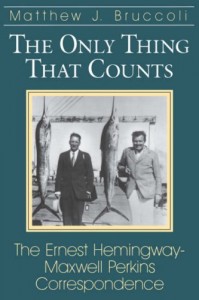 I’ve been reading The Only Thing That Counts, the correspondence of Maxwell Perkins and Ernest Hemingway, edited by Matthew J. Bruccoli. I’ve marked many pages to go back and re-read, but here’s one image I can’t shake. It’s in the preface by Charles Scribner III, where he quotes a speech his own father (Charles Scribner, Jr.) gave in 1985 about being Hemingway’s publisher.
I’ve been reading The Only Thing That Counts, the correspondence of Maxwell Perkins and Ernest Hemingway, edited by Matthew J. Bruccoli. I’ve marked many pages to go back and re-read, but here’s one image I can’t shake. It’s in the preface by Charles Scribner III, where he quotes a speech his own father (Charles Scribner, Jr.) gave in 1985 about being Hemingway’s publisher.
“I think that from the start there was a kind of enchantment about his commitment to writing. Robert Louis Stevenson, in his autobiographical essay “The Lantern Bearers,” describes the excitement he felt as a boy when he and his comrades would meet after dark, each of them carrying a bull’s-eye lantern under his topcoat. All the lanterns were lit but kept covered for the greater part of the expedition. Then, at the end, they were uncovered and allowed to shine out full strength. But for those boys roaming the streets of Edinburgh, the bliss in the adventure lay in the knowledge that the lanterns were lit and burning brightly even in the dark under their topcoats.
Like all true artists, Hemingway carried from the start a bull’s-eye lantern under his topcoat. Most of the time he kept it hidden from outsiders; he would talk about it tangentially, if at all. But it was there all the time, the most important thing in his life.”
I don’t think I’ve ever heard a better description of the strangeness and magic that, with luck, sometimes spills onto the page. Like Hemingway and Stevenson, all writers carry lanterns under their topcoats, even when they walk purposely into the dark.






Makes me think of this aphorism (attributed to Doctorow): Writing is like driving at night in the fog. You can only see as far as your headlights, but you can make the whole trip that way.